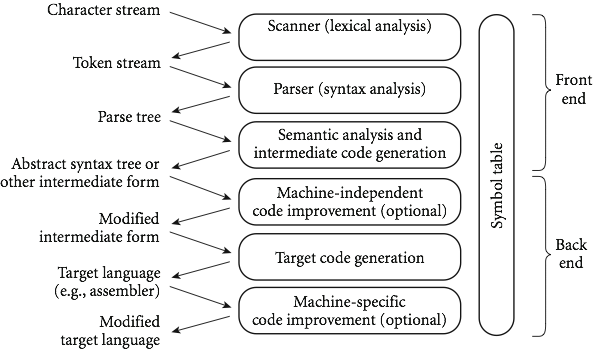Difference between revisions of "Multi-Paradigm Programming and Scripting"
Adelo Vieira (talk | contribs) (→Reflection in Java) (Tag: Visual edit) |
Adelo Vieira (talk | contribs) |
||
| Line 44: | Line 44: | ||
<br /> | <br /> | ||
===Reflection in Java=== | ===Reflection in Java=== | ||
| − | |||
*Limited support from <code>java.lang.Class</code> | *Limited support from <code>java.lang.Class</code> | ||
| Line 50: | Line 49: | ||
*The <code>getClass</code> method of <code>Class</code> returns the <code>Class</code> object of an object | *The <code>getClass</code> method of <code>Class</code> returns the <code>Class</code> object of an object | ||
| − | |||
::<code>float[] totals = new float[100];</code> | ::<code>float[] totals = new float[100];</code> | ||
::<code>Class fltlist = totals.getClass();</code> | ::<code>Class fltlist = totals.getClass();</code> | ||
| Line 56: | Line 54: | ||
*If there is no object, use class field: | *If there is no object, use class field: | ||
| + | ::<code>Class stg = String.class;</code> | ||
| − | + | * '''Class has four useful methods:''' | |
| − | + | :: <code>getMethod</code> searches for a specific public method of a class | |
| + | :: <code>getMethods</code> returns an array of all public methods of a class | ||
| + | :: <code>getDeclaredMethod</code> searches for a specific method of a class | ||
| + | :: <code>getDeclaredMethods</code> returns an array of all methods of a class | ||
| + | :: The <code>Method</code> class defines the invoke method, which is used to execute the method found by <code>getMethod</code></blockquote><br /> | ||
<br /> | <br /> | ||
Revision as of 19:40, 30 October 2019
- Improved background for choosing appropriate languages
Contents
Compilation vs Interpretation
Phases of Compilation
C++ Inheritance
https://www.w3schools.com/cpp/cpp_inheritance.asp
https://www.tutorialspoint.com/cplusplus/cpp_interfaces.htm
Difference Between Static and Dynamic Binding
https://techdifferences.com/difference-between-static-and-dynamic-binding.html
Reflection in Java
A programming language that supports reflection allows its programs to have runtime access to their types and structure and to be able to dynamically modify their behavior
- The types and structure of a program are called
metadata
- The process of a program examining its metadata is called
introspection
- Interceding in the execution of a program is called
intercession
Uses of reflection for software tools:
- Class browsers need to enumerate the classes of a program
- Visual IDEs use type information to assist the developer in building type correct code
- Debuggers need to examine private fields and methods of classes
- Test systems need to know all of the methods of a class
Reflection in Java
- Limited support from
java.lang.Class
- Java runtime instantiates an instance of
Classfor each object in the program
- The
getClassmethod ofClassreturns theClassobject of an object
float[] totals = new float[100];Class fltlist = totals.getClass();Class stg = "hello".getClass();
- If there is no object, use class field:
Class stg = String.class;
- Class has four useful methods:
getMethodsearches for a specific public method of a classgetMethodsreturns an array of all public methods of a classgetDeclaredMethodsearches for a specific method of a classgetDeclaredMethodsreturns an array of all methods of a class- The
Methodclass defines the invoke method, which is used to execute the method found bygetMethod
